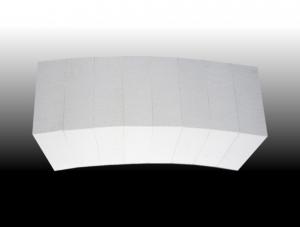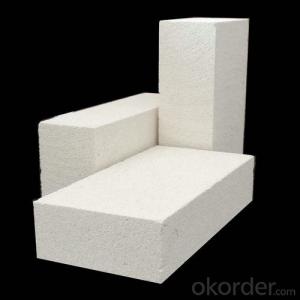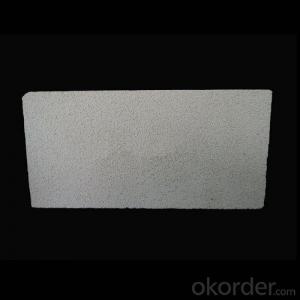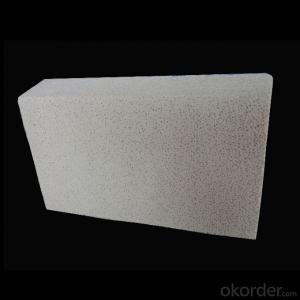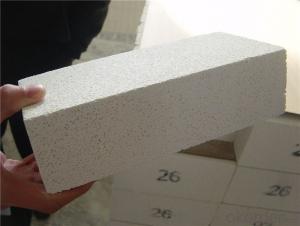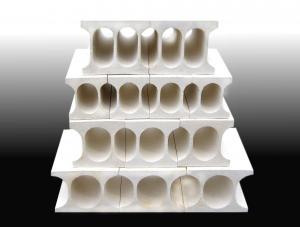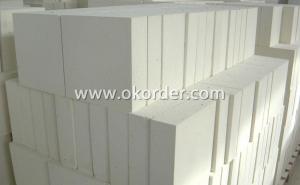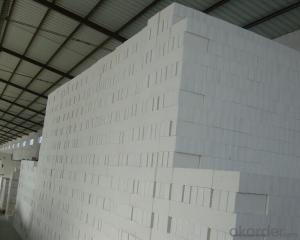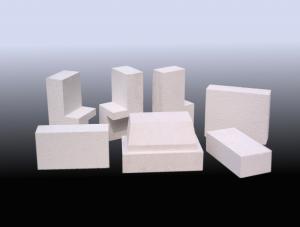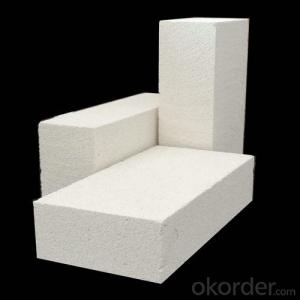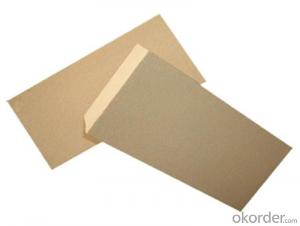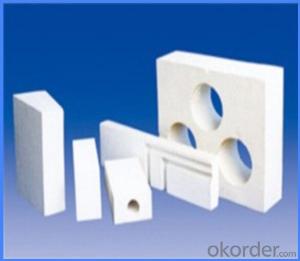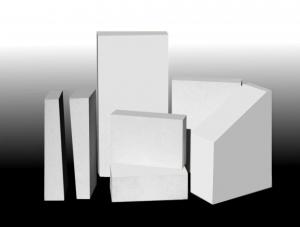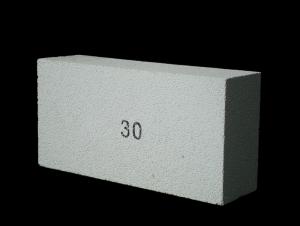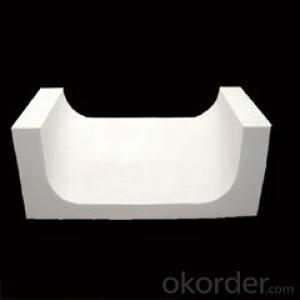Insulating Fire Brick GJM26 - High Quality Insulation for Fire Safety
- Loading Port:
- China Main Port
- Payment Terms:
- TT OR LC
- Min Order Qty:
- -
- Supply Capability:
- -
OKorder Service Pledge
Quality Product, Order Online Tracking, Timely Delivery
OKorder Financial Service
Credit Rating, Credit Services, Credit Purchasing
You Might Also Like
General Information
CMAX insulating firebricks are classified under temperature between 1300℃ to 1700℃, manufactured from high purity alumina clay.
Feature
Light weight and low thermal conductivity
Low heat storage
Low iron and impurities
High thermal shock resistance
Application
CMAX insulating firebricks can be used as a hot face lining directly exposed to the heat or as a backup insulation layer in iron and steel mills, non-ferrous foundries, petrochemical, ceramic, glass.
- Q: Can insulating fire bricks be used in blast furnaces?
- Yes, insulating fire bricks can be used in blast furnaces. Insulating fire bricks are designed to withstand high temperatures and provide excellent thermal insulation, making them suitable for lining the walls of blast furnaces. Their insulation properties help to minimize heat loss and improve energy efficiency in the furnace, ultimately enhancing the overall performance and productivity of the blast furnace.
- Q: Are insulating fire bricks resistant to fluorine gas?
- Yes, insulating fire bricks are generally resistant to fluorine gas due to their refractory properties and ability to withstand high temperatures and chemical corrosion.
- Q: Can insulating fire bricks be used in the construction of heat storage units?
- Indeed, the utilization of insulating fire bricks is viable in the construction of heat storage units. These bricks are specifically engineered to endure extreme temperatures and possess exceptional thermal insulation properties. They are commonly employed in scenarios where heat retention holds significance, such as furnaces, kilns, and heat storage units. With their low thermal conductivity, these bricks effectively retain and preserve heat for extended durations, rendering them an ideal choice for heat storage units designed to capture and store heat energy for later usage. Additionally, these bricks are lightweight and easy to manipulate, making them a practical selection for construction projects. All in all, incorporating insulating fire bricks into the construction of heat storage units is a suitable and dependable option.
- Q: Can insulating fire bricks be used in biomass boilers?
- Indeed, insulating fire bricks are applicable in biomass boilers. These bricks are specifically engineered to possess minimal thermal conductivity, thereby aiding in the preservation of heat within the boiler and augmenting its overall efficiency. When employed in biomass boilers, these bricks function as linings for the combustion chamber, effectively confining the heat and preventing its dissipation. Moreover, insulating fire bricks exhibit exceptional resistance to elevated temperatures, rendering them suitable for use in biomass boilers where combustion temperatures can soar to several hundred degrees Celsius. Ultimately, the utilization of insulating fire bricks in biomass boilers serves to heighten their thermal efficiency, thereby lending support to a more proficient and sustainable energy production process.
- Q: What are the bubble bricks?
- The steam free aerated block has the advantages of wide raw material sources, high waste rate and low cost. With fly ash, slag, sand, sand, soil containing low amount of powder and tailings as the main raw materials (with one can), local materials, low cost, high profit.
- Q: Can insulating fire bricks be used in the construction of smelter crucibles?
- Yes, insulating fire bricks can be used in the construction of smelter crucibles. These bricks are designed to withstand high temperatures and provide excellent insulation, making them suitable for use in smelting applications. They help to retain heat and minimize heat loss, ensuring efficient and effective smelting processes.
- Q: Can insulating fire bricks be used in the construction of glass bottle production furnaces?
- Yes, insulating fire bricks can be used in the construction of glass bottle production furnaces. Insulating fire bricks are designed to withstand high temperatures and provide excellent thermal insulation. They are often used in applications that require heat retention and energy efficiency, such as furnaces. By using insulating fire bricks in the construction of glass bottle production furnaces, the heat generated during the glass-making process can be effectively contained within the furnace, reducing heat loss and improving energy efficiency. This can result in cost savings and improved production performance. Additionally, insulating fire bricks can help protect the structural integrity of the furnace by minimizing thermal stress and preventing heat transfer to the surrounding environment. Overall, the use of insulating fire bricks in glass bottle production furnaces can contribute to more efficient and durable furnace operation.
- Q: Can insulating fire bricks be used in glass melting furnaces?
- Glass melting furnaces can utilize insulating fire bricks. These bricks are specifically created using materials with exceptional insulating properties, like lightweight refractory fibers, and are engineered to minimize the loss of heat. When operating in glass melting furnaces, which necessitate high temperatures, these bricks can be employed to line the furnace's walls and roof, effectively decreasing heat transfer to the surroundings and enhancing energy efficiency. They are capable of sustaining elevated temperatures within the furnace, reducing fuel consumption, and optimizing the overall performance of the glass melting procedure. Nevertheless, it is worth noting that insulating fire bricks may possess lower resistance to chemical attack and wear when compared to other refractory materials. Consequently, it may be necessary to complement them with alternative refractories in certain sections of the furnace that face harsh conditions.
- Q: Are insulating fire bricks resistant to freeze-thaw cycles?
- Yes, insulating fire bricks are generally resistant to freeze-thaw cycles. These bricks are designed to withstand extreme temperature changes, including freezing and thawing, without cracking or deteriorating.
- Q: What is the typical creep resistance of an insulating fire brick?
- The typical creep resistance of an insulating fire brick can vary depending on the specific composition and manufacturing process of the brick. However, in general, insulating fire bricks have good creep resistance properties due to their high temperature stability and low thermal conductivity. These bricks are designed to withstand high temperatures and are often used in applications where thermal insulation and resistance to thermal stress are important, such as in kilns, furnaces, and other high-temperature industrial processes. Insulating fire bricks are typically made from lightweight refractory materials, such as alumina, silica, or other refractory oxides. These materials are chosen for their ability to resist deformation and maintain their shape under high temperatures. Creep is the gradual deformation or flow of a material under the influence of constant stress over time. In the case of insulating fire bricks, the creep resistance refers to their ability to maintain their structural integrity and dimensional stability even when exposed to prolonged high temperatures. Insulating fire bricks are designed to have low creep rates, meaning that they exhibit minimal deformation or flow under sustained stress. This is achieved through careful selection of raw materials, controlled manufacturing processes, and the addition of certain additives or binders that enhance the creep resistance of the brick. While the specific creep resistance values may vary, insulating fire bricks are generally engineered to withstand high temperatures and exhibit good resistance to creep, ensuring long-lasting performance and durability in high-temperature environments.
Send your message to us
Insulating Fire Brick GJM26 - High Quality Insulation for Fire Safety
- Loading Port:
- China Main Port
- Payment Terms:
- TT OR LC
- Min Order Qty:
- -
- Supply Capability:
- -
OKorder Service Pledge
Quality Product, Order Online Tracking, Timely Delivery
OKorder Financial Service
Credit Rating, Credit Services, Credit Purchasing
Similar products
Hot products
Hot Searches
Related keywords
